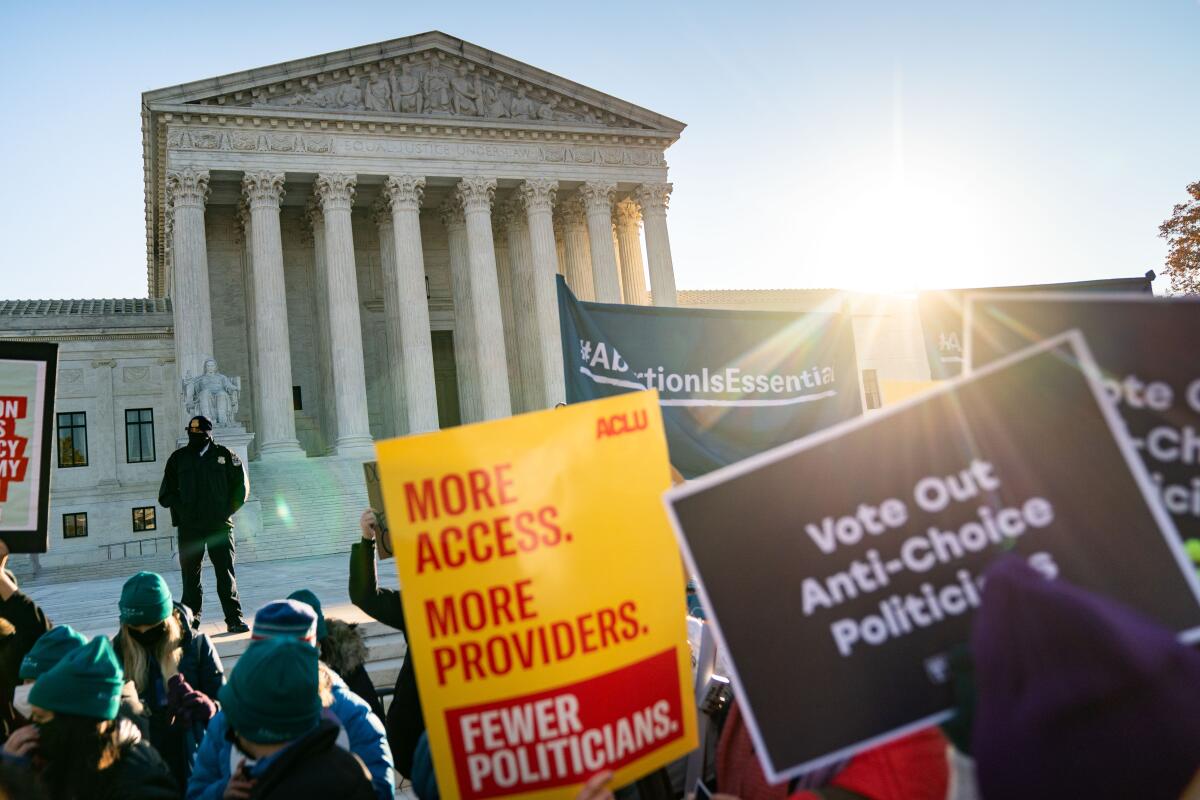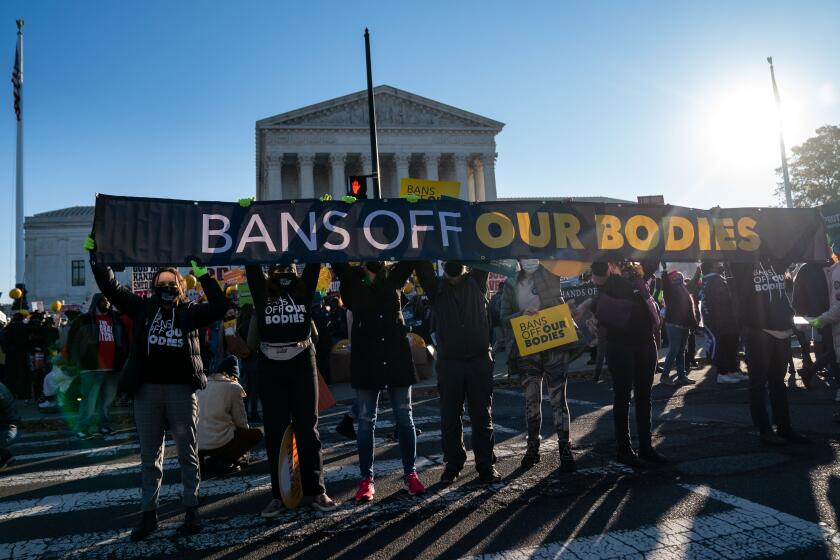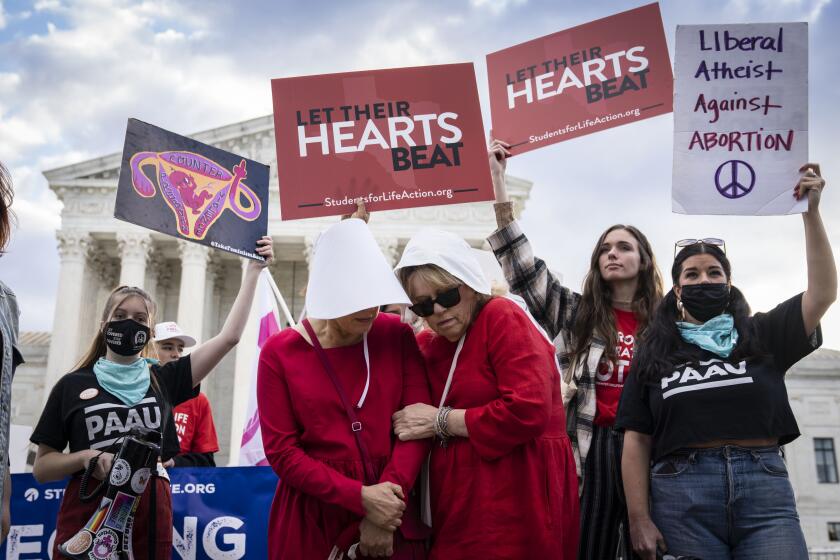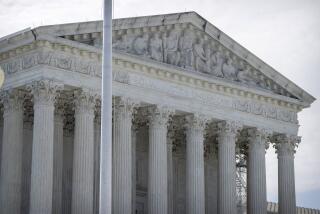Op-Ed: Supreme Court decision on Texas abortion law puts all of our constitutional rights in jeopardy

- Share via
The Supreme Court’s decision on Friday to allow a legal challenge to proceed against the Texas law banning abortions after six weeks of pregnancy is on its surface encouraging, but there is much that is deeply disturbing about the ruling.
Although the court ruled that some Texas officials can be sued to block the antiabortion statute, it also made clear how states can nullify federal constitutional rights through the use of the Texas scheme. The court’s refusal to block the blatantly unconstitutional Texas law is also a strong signal that it is poised to overturn Roe vs. Wade.
The Texas law, SB 8, which went into effect on Sept. 1, prohibits abortions before many women even know that they are pregnant. This blatantly violates the standard set in Roe, which held that states cannot prohibit abortions before fetal viability, at about 24 weeks of pregnancy.
A divided Supreme Court refused Friday to block a Texas law that has banned most abortions in the state.
The quirk of the Texas ban is that enforcement is done by private citizens suing doctors and those who aid or abet an abortion for $10,000 per violation. Under that threat of civil suits, nearly all clinics in Texas have stopped performing abortions after the sixth week rather than risk liability.
The court on Friday held, 8 to 1, that the state officials who are responsible for licensing reproductive healthcare facilities may be sued to block the law. But the court, 5 to 4, also held that the attorney general of Texas, the judges in Texas and the court clerks cannot be sued because they don’t enforce the law.
In this decision, five conservative justices have provided a road map for Texas and other states to use in shielding unconstitutional laws from court injunctions: Just eliminate any role of state officials in enforcing the law. If Texas were to revise the statute to make clear that the licensing officials play absolutely no role in carrying out the abortion ban, then no official in Texas could be sued to block it.
If Texas is right, there would be almost no limit on the power of states to violate the U.S. Constitution.
As Justice Sonia Sotomayor expressed in her dissent, this ruling now “leaves all manner of constitutional rights more vulnerable than ever before, to the great detriment of our Constitution and our Republic.”
The court has put in great jeopardy a basic legal principle that no one should have to violate a law in order to challenge its constitutionality. The reason for that principle is to prevent the government from violating and chilling the exercise of constitutionally protected rights. For instance, a state could create civil liability for anyone who performs a same-sex wedding or criticizes the governor. The state then could set civil liability at $1 million so that no one would risk exercising those rights for fear of being sued by other private citizens.
It is also dangerous that the court dismissed the suit by the United States against Texas. It is essential that the federal government be able to sue state governments to protect the rights of all Americans, no matter where they live.
Finally, it is stunning that the court allowed the Texas law to remain in effect despite its clear conflict with Roe. Last week, the court heard oral arguments in Dobbs vs. Jackson’s Women’s Health Organization, a case about a Mississippi law that prohibits abortions after 15 weeks of pregnancy. It seemed clear that the conservatives on the court would gut Roe, but until that decision comes down next year, Roe remains the law of the land and women have the constitutional right to abortion until the point of viability.
Dobbs vs. Jackson Women’s Health Organization is the most important abortion case to come before the Supreme Court in almost three decades.
Chief Justice John G. Roberts Jr., no liberal, wrote in a dissenting part of his opinion on the Texas law: “The clear purpose and actual effect of S.B. 8 has been to nullify this Court’s rulings.” He cited an 1809 court decision that applies precisely to the Texas statute: “If the legislatures of the several states may, at will, annul the judgments of the courts of the United States, and destroy the rights acquired under those judgments, the Constitution itself becomes a solemn mockery.”
Roberts concluded, “The nature of the federal right infringed does not matter; it is the role of the Supreme Court in our constitutional system that is at stake.”
The conservative court on Friday has severely undermined federal judicial supremacy and put all of our constitutional rights in jeopardy.
Erwin Chemerinsky is dean of the UC Berkeley School of Law and a contributing writer to Opinion. He is the author most recently of “Presumed Guilty: How the Supreme Court Empowered the Police and Subverted Civil Rights.”
More to Read
A cure for the common opinion
Get thought-provoking perspectives with our weekly newsletter.
You may occasionally receive promotional content from the Los Angeles Times.













